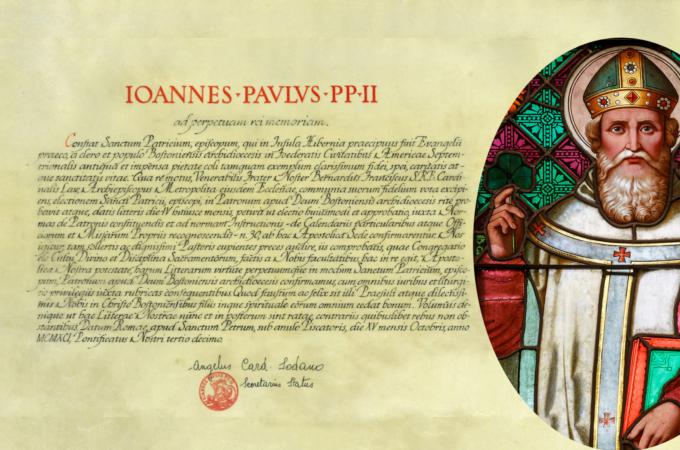'Longstanding and deep devotion' -- How St. Patrick became Boston's patron saint
St. Patrick's Day, or the feast of St. Patrick, takes place annually on March 17. It is a day to celebrate Irish culture and to commemorate the life of St. Patrick, bishop of Ireland. Across the country and around the world, people mark the holiday with traditional foods, such as corned beef and cabbage, parades, and the wearing of green attire and shamrocks.
Here in the Archdiocese of Boston, the holiday is a special one, not only because of the large number of Irish-Americans living in the archdiocese but also because St. Patrick is our patron saint. On Oct. 15, 1991, Pope John Paul II issued a decree formally establishing St. Patrick as the patron saint of the Archdiocese of Boston.
In the Catholic Church, patron saints are intercessors before God for a particular church, occupation, group, or geographical area. They serve as advocates for the faithful, who in turn venerate them with special customs of religious observance. Although historically many patron saints have been established by custom and tradition rather than by formal decree, today the Vatican has a process, overseen by the Congregation for Divine Worship and Discipline of the Sacraments, to establish official patron saints. The decree establishing St. Patrick as the patron saint of the archdiocese emerged from this process.
"It is agreed," the decree begins, "that St. Patrick, bishop, who was the principal evangelizer of the Island of Ireland, has been honored by the clergy and the people of the Archdiocese of Boston in the United States of North America by a longstanding and deep devotion as a most outstanding example of faith, hope, charity, and holiness of life."
That there should be a "longstanding and deep devotion" to St. Patrick in and around the city of Boston is no surprise to those who know something of the history of Irish immigration to this country. The 19th century saw Irish arrive in Boston by the tens of thousands, especially after the Irish Potato Famine of the 1840s and 1850s. In time, the Irish became the single largest ethnic group in Boston, and they and myriad other immigrant groups transformed the city of Boston from an Anglo-Saxon stronghold to a diverse, multi-ethnic municipality.
Today, people of Irish descent remain the largest ethnic group in Boston, comprising 22.8 percent of the population of the Boston metro area, the highest percentage of any of the 50 most populous American cities. According to the 2010 census, the town of Scituate in the archdiocese claims the highest percentage of Irish residents in the nation; nearly 50 percent of the town's residents claim Irish ancestry.
Given the predominance of Irish Americans under his care, on Oct. 4, 1991, Cardinal Bernard Law sent a letter to the Vatican, asking that the "united wishes of his faithful" be "duly approved by the choice of St. Patrick, bishop, as patron before God of the Archdiocese of Boston." His request was swiftly approved by the Congregation for Divine Worship and Discipline of the Sacraments and was subsequently confirmed by Pope John Paul II, in the hopes that "this be auspicious to that leader and to our beloved Boston sons in Christ, and yield spiritual benefit to them all."
In the years since St. Patrick became the official patron of the archdiocese, a number of new traditions have emerged to celebrate his feast day on March 17. In years when St. Patrick's Day fell on a Friday in Lent (2006 and 2017), Cardinal O'Malley lifted the obligation to abstain from meat so that Catholics in the archdiocese could still eat traditional holiday foods such as corned beef. Each year, a St. Patrick's Day Mass is held at the Cathedral of the Holy Cross. A statue of St. Patrick is placed next to the altar, adorned with hundreds of shamrocks. A beloved part of that Mass is the annual blessing and distribution of shamrocks by the bishop. The Mass is usually followed by a reception featuring traditional Irish food and music.
Although the COVID-19 pandemic interfered with last year's festivities, St. Patrick is the patron of the archdiocese "in perpetuity," according to the 2001 decree. We anticipate many joyful St. Patrick's Days to come.
VIOLET HURST IS AN ARCHIVIST FOR THE ARCHDIOCESE OF BOSTON.



















